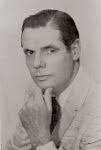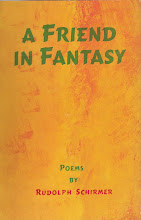
My father was a gentleman - and an artist. All of you knew the gentleman. I would like to remember the artist.
A friend once said that one's life is one's greatest work of art. I think that's true, and I'm sure my father would agree. But few have the ability to express that journey with such artistry as he.
On this occasion, I thought it best to let him speak.
The following excerpts, taken from a travel journal entitled, "European Footsteps", might well be a description of my father's love of the process of being alive, which I consider to be his greatest gift to me.
"It is not easy to pin-point the multiple entrancement which overtakes an American returning after a long interval to France...There is a dazzlement, a piercing joy, a rapture which is close to tears that seizes, quickens and remakes him on the spot...You would partake of all and let all partake of you. Each prospect, each arcade and plaza, wall, fissure, crevice, you would touch and claim. You would reach up to the mysterious, foreign moon, merge with it, commune with it, while through your feet flowed the benediction of an exotic but dearly familiar soil...For the moment I was lifted above the stubborn facts of existence into a sphere in which all was transmuted to an ecstatic pageant. Ugliness was no longer a curse, imperfection no more a hindrance. The pangs of hostility had been removed so that the full friendliness of the world might have scope to manifest. There was no more barrier to love, no stoppage of the currents of affection. Overwhelmed by this equable vision, one saw the sublimity of poverty and the insignificance of riches. There was a splendor in everything, even in squalor; no, for there was no squalor; the squalor that existed before was attributable simply to the fallible perspective of the beholder. Getting off at your port of preference, you had fallen in love with soil and stone and flesh and you knew what it was, for an enchanted instant, to move in harmony with all created things."
As a poet, he also found words to express a gift that he received.
For Raffaela...
OUR JOY
Little is glad, and that little, brief.
In the heart's red realm, disappointment is chief.
So the wonderment grows of your love for me,
Which lingers and deepens. How can it be?
How is it possible, tears being our lot,
That joy ever quickens and grief is forgot?
May sorrow not come like a thief in the night
To pilfer love's pleasure and throttle its light?
Deeply I fear it and prudently mark
The ember implicit in love's blue spark.
But staunch as a pillar you stand to your vow -
No vapid "forever", but steadfast "now!".
The leaf and the feather fare not so well;
They change with the weather, and no man can tell
If tomorrow will tarnish, infringe or destroy
Their delicate texture. Not so our joy!
For that in your keeping stays blooming all year,
Rose-cheeked and cheerful, with hardly a tear,
And seldom a shadow to chill or to blur
The blossomy idyll of hearts that concur.
"It can't be, it can't be!" pale cynics protest.
"Love is a mutable banquet at best.
Its nature is fickle, its promises frail;
Stout pledges belying, its fervors fail."
"Nonsense!" we whisper, serenely caressing,
Knowing who measures and envies our blessing.
"Bless you," I breathe in the dark before sleeping.
"Peace to our joy. For our love, scant weeping!"
And to his friends, who will be the keepers of his joy.
HAPPENING
When it happens
As it should,
Without prodding
Or reminding,
Undissembled,
Undesigning,
Irridescent,
Understood,
Offer prayers
Without prompting
And salute
The passerby,
None exempting,
Eye to eye:
Love is holy,
God is good.
With love, Liane.
___________________________________
Thursday, December 5, 2000 at ten o'clock
St. Bartholomew's Church
109 East 50th Street
New York
Rev. Bruce W. Forbes
Adagio for Strings - Samuel Barber
Careyes Suite - Stephen Kates, cello and Doris Stevenson, pianist
Louange a l'Eternite de Jesus - Olivier Messiaen
Stephen Kates, cello and Doris Stevenson, pianist
Adagio, BWV 564 - Johann Sebastian Bach
Stephen Kates, cello and Doris Stevenson, pianist
Organ - Allabreve pro organo pleno, BWV 589 - Johann Sebastian Bach
Stephen Kates, cello and Doris Stevenson, pianist, William K. Trafka, Organ
A friend once said that one's life is one's greatest work of art. I think that's true, and I'm sure my father would agree. But few have the ability to express that journey with such artistry as he.
On this occasion, I thought it best to let him speak.
The following excerpts, taken from a travel journal entitled, "European Footsteps", might well be a description of my father's love of the process of being alive, which I consider to be his greatest gift to me.
"It is not easy to pin-point the multiple entrancement which overtakes an American returning after a long interval to France...There is a dazzlement, a piercing joy, a rapture which is close to tears that seizes, quickens and remakes him on the spot...You would partake of all and let all partake of you. Each prospect, each arcade and plaza, wall, fissure, crevice, you would touch and claim. You would reach up to the mysterious, foreign moon, merge with it, commune with it, while through your feet flowed the benediction of an exotic but dearly familiar soil...For the moment I was lifted above the stubborn facts of existence into a sphere in which all was transmuted to an ecstatic pageant. Ugliness was no longer a curse, imperfection no more a hindrance. The pangs of hostility had been removed so that the full friendliness of the world might have scope to manifest. There was no more barrier to love, no stoppage of the currents of affection. Overwhelmed by this equable vision, one saw the sublimity of poverty and the insignificance of riches. There was a splendor in everything, even in squalor; no, for there was no squalor; the squalor that existed before was attributable simply to the fallible perspective of the beholder. Getting off at your port of preference, you had fallen in love with soil and stone and flesh and you knew what it was, for an enchanted instant, to move in harmony with all created things."
As a poet, he also found words to express a gift that he received.
For Raffaela...
OUR JOY
Little is glad, and that little, brief.
In the heart's red realm, disappointment is chief.
So the wonderment grows of your love for me,
Which lingers and deepens. How can it be?
How is it possible, tears being our lot,
That joy ever quickens and grief is forgot?
May sorrow not come like a thief in the night
To pilfer love's pleasure and throttle its light?
Deeply I fear it and prudently mark
The ember implicit in love's blue spark.
But staunch as a pillar you stand to your vow -
No vapid "forever", but steadfast "now!".
The leaf and the feather fare not so well;
They change with the weather, and no man can tell
If tomorrow will tarnish, infringe or destroy
Their delicate texture. Not so our joy!
For that in your keeping stays blooming all year,
Rose-cheeked and cheerful, with hardly a tear,
And seldom a shadow to chill or to blur
The blossomy idyll of hearts that concur.
"It can't be, it can't be!" pale cynics protest.
"Love is a mutable banquet at best.
Its nature is fickle, its promises frail;
Stout pledges belying, its fervors fail."
"Nonsense!" we whisper, serenely caressing,
Knowing who measures and envies our blessing.
"Bless you," I breathe in the dark before sleeping.
"Peace to our joy. For our love, scant weeping!"
And to his friends, who will be the keepers of his joy.
HAPPENING
When it happens
As it should,
Without prodding
Or reminding,
Undissembled,
Undesigning,
Irridescent,
Understood,
Offer prayers
Without prompting
And salute
The passerby,
None exempting,
Eye to eye:
Love is holy,
God is good.
With love, Liane.
___________________________________
Thursday, December 5, 2000 at ten o'clock
St. Bartholomew's Church
109 East 50th Street
New York
Rev. Bruce W. Forbes
Adagio for Strings - Samuel Barber
Careyes Suite - Stephen Kates, cello and Doris Stevenson, pianist
Louange a l'Eternite de Jesus - Olivier Messiaen
Stephen Kates, cello and Doris Stevenson, pianist
Adagio, BWV 564 - Johann Sebastian Bach
Stephen Kates, cello and Doris Stevenson, pianist
Organ - Allabreve pro organo pleno, BWV 589 - Johann Sebastian Bach
Stephen Kates, cello and Doris Stevenson, pianist, William K. Trafka, Organ









Hello to whom this may concern: My name is Agnew Wilson. I am a direct descendent of Gustav Schirmer. He was my great great grandfather. I am searching for any books that describe his family life and business life and I also am interested in Rudolphos' peotry. I know that he wrote a poem that was about the spanish Civil War that he was able to present to a sitting Pope. My e-mail address is kazoor277@aol.com
ReplyDelete